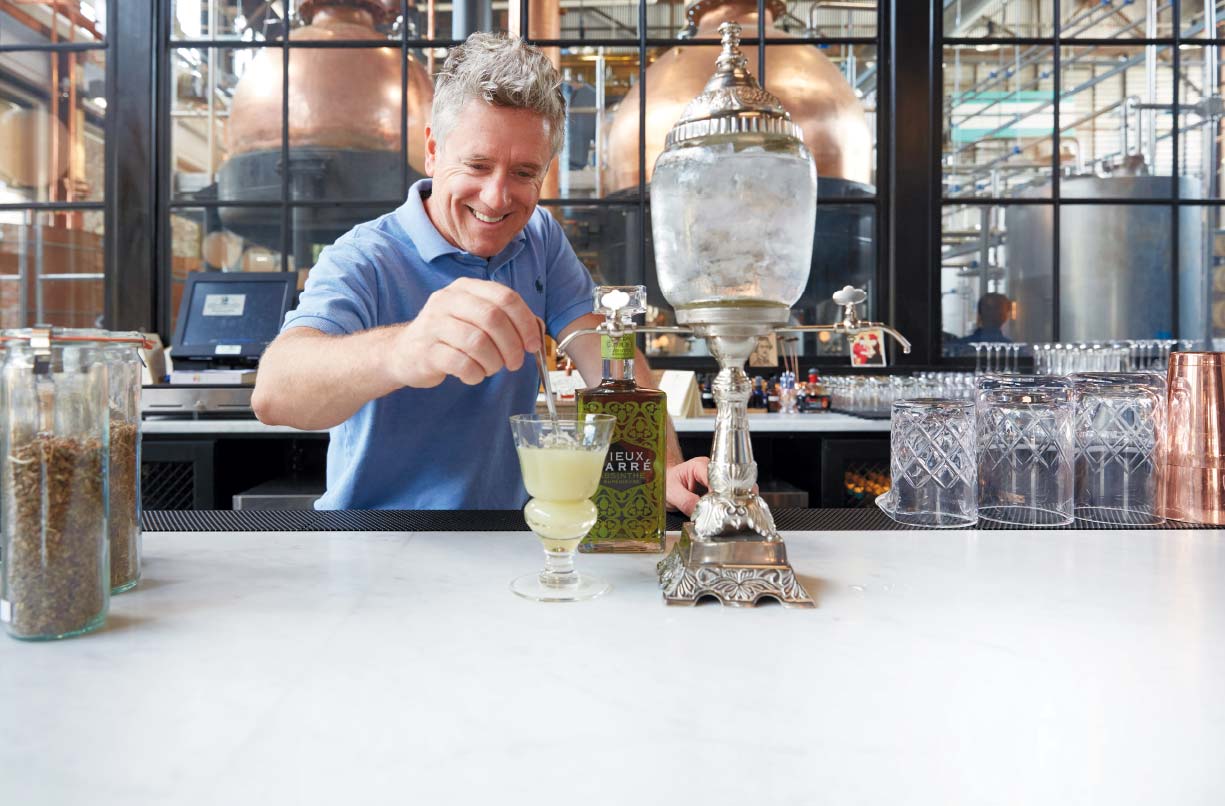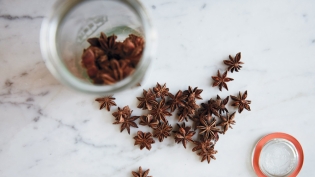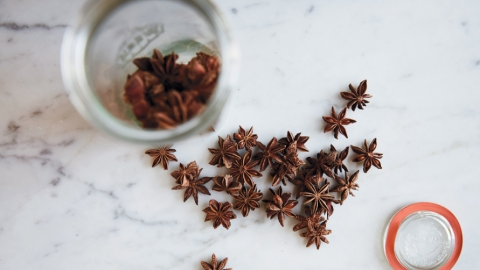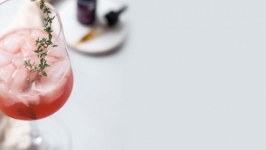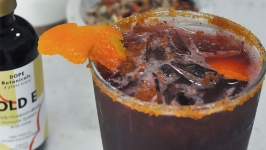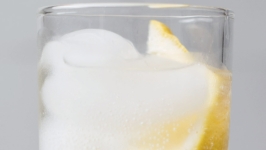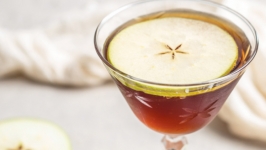Creative Spirits
Philly’s craft distillers shake up the cocktail scene
One night, Marat Mamedov, his wife Zsuzsa Palotas and his brother Vlad Mamedov got together for a couple of drinks and began reminiscing. The trio, who all grew up in Europe, remembered the culture of local spirits and lamented the lack of their homelands’ fruit-based spirits here in the United States.
Marat, an Armenian who grew up in Azerbaijan, remembers tasting his first apricot as a young boy. The juicy fruit has been a symbol of nationality and victory for Armenians for centuries. Armenians don’t just eat apricots fresh: they dry them, marinate them and distill their juice to produce alcohol. Marat and Vlad spent their childhoods eating the fruit in all forms and, when they were older, drinking the spirits made from it.
Growing up in Hungary, Palotas’s family enjoyed pálinka, a fruit-based distillate. Hungary’s Carpathian basin produces quality fruit in abundance, which makes pálinka the go-to drink. “It’s how you start the meal, end the meal and what you drink during the meal,” she says.
All three had successful corporate careers where they travelled the world and consulted for big name companies. On a work assignment, Marat and Palotas found themselves at a Boeing plant, thinking big thoughts. “We were staring at the giant planes and we thought, why don’t we do that?” Marat recalls. “Let’s create something of our own.”
Marat said farewell to the corporate boardroom and together the three created Boardroom Spirits. In addition to vodka, rum, gin and three flavored vodkas, the Lansdale-based distillery is developing what the founders call a Periodic Table of Spirits.
It started with “B,” beet spirit—made from 100 percent raw red beets. Then came “C,” carrot spirit, made from 100 percent fermented carrots. These aren’t simply flavored vodkas—they are vegetable-based, 92-proof eau de vie–style spirits–an homage to the European fruit-based distillates found in Armenia and Hungary.
As American craft distilleries have grown in popularity in recent years, local spirits are being made in all corners of the country. Most craft distilleries produce whiskey, vodka and gin, with the occasional moonshine or rum. Vodka, flavored vodka and bourbon are overwhelmingly the most popular products sold in Pennsylvania Fine Wine & Good Spirits stores, according to sales data from the Pennsylvania Liquor Control Board. Philadelphia distilleries certainly make those crowd-pleasing spirits, but a growing number have other tricks up their sleeves.
East Kensington’s Rowhouse Spirits produces small batches of gin, rum and whiskey, as well as a few unusual distillations. Owner Dean Browne’s last job before opening his distillery sent him around the world and frequently to Sweden. “When I travel, I love going out with locals and doing what they do, drinking what they drink, eating what they eat,” Browne says. He became a fan of aquavit, a caraway-flavored spirit that’s ubiquitous in Scandinavia. In 2016, Browne released his Nordic Akvavit—flavored with caraway, dill, and fennel—and today it’s his second-best seller, behind his gin.
Rowhouse also makes Bear Trap, a low-proof herbal liqueur flavored with 19 herbs and spices, and an amaro, a style of bitter herbal liqueur that has been growing in popularity in the U.S., made with local wine, peaches and herbs. Browne’s products are especially popular in Philadelphia bars; some go through two bottles of Bear Trap a day. His amaro was created in collaboration with William Reed at Standard Tap. Bar Hygge uses Nordic Akvavit in its Bloody Mary; Martha mixes it into a Nordic Old Fashioned. Bartenders get it. But in the tasting room, Browne has some explaining to do.
“It’s different, it’s vegetal, and nothing like that
existed in the U.S.,” Mamedov says.
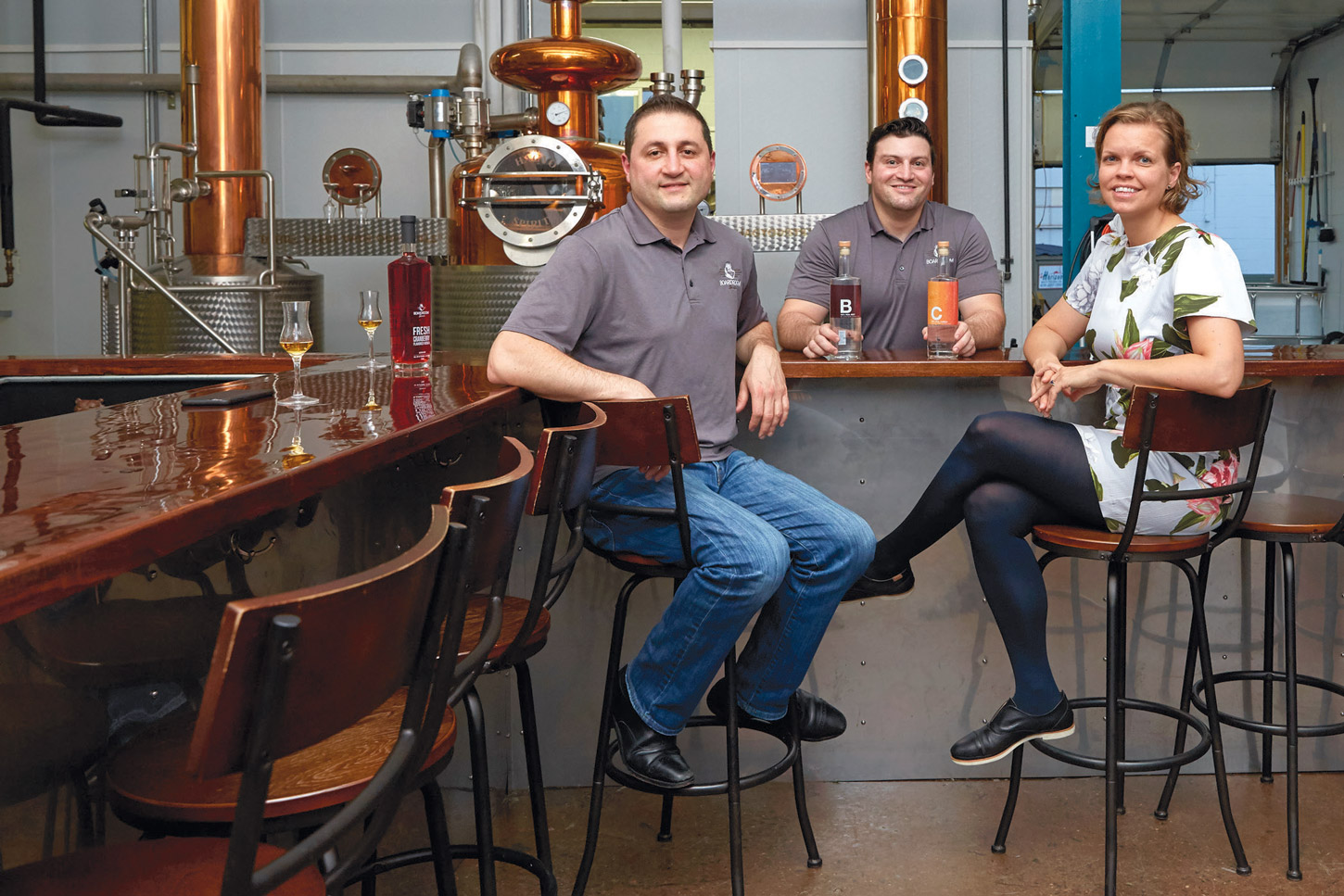
Owners of Boardroom Spirits, Vlad Mamedov, Marat Mamedov, and
Zsuzsa Palotas enjoying cocktails in the distillery’s tasting room
“I make quite a bit of esoteric booze, so I spend a lot of time in the tasting room explaining to people what these things are and why I make them,” Browne says. A man on a mission, he has two new amaro varieties coming out in the fall.
When absinthe was legalized in the U.S. a decade ago, Philadelphia Distilling launched one of the first legal American absinthes to be distilled, bottled, and sold east of San Francisco. “It was a real challenge for us to make Vieux Carré,” says Andrew Auwerda, president at Philadelphia Distilling. It took a lot of research and development, but the opportunity was too good to pass up. Plus, the process and equipment needed are similar to those for gin, which the company had already perfected. Its flagship product, Bluecoat Gin (launched in 2006), has quickly become one of the country’s leading top-shelf craft gins. “Why not also make something completely unique and define ourselves with another spirit?” Auwerda says.
After absinthe was legalized, interest spiked for about a year. The media covered it heavily and drinkers were very interested, Auwerda recalls. “Young people were going out hoping to find the hallucinogenic effect,” he says. He doesn’t buy into that, but says that in his experience there are grains of truth to the legends, in that the spirit is thought-provoking, meditative and contemplative—as opposed to gin, thought by some to be energizing. After that first year, interest in the spirit settled down and sales have held at a steady, flat rate for several years. Absinthe is still a niche spirit, but it’s critical in making certain classic cocktails, such as the Corpse Reviver N.20.
“We love to make it and will continue having it as part of our portfolio,” Auwerda says. “It’s a key component in certain cocktails, and the right kind of cocktail bars need it and appreciate it.”
Boardroom Spirits has experienced a similar reaction in the market. “Initially, we were going to start off with the vegetable-based spirits because of the cultural aspects,” Marat says. “Then we looked at the market and said, ‘We’re gonna be bankrupt, let’s look at other options.’” Their vodka was the first product to enter the market. It’s currently the company’s best seller and is sold in liquor stores, which helps fund more creative work.
To develop their vegetal spirits, Boardroom worked with a PhD student at Corvinus University of Budapest (which has master’s and doctoral programs in fermentation and distillation; Hungary is one of only a few countries that allows home distillation and has a rich history of creating fruit-based alcohol). They sampled 45 products in two days and landed on developing and launching the Beet Spirit.
“It’s different, it’s vegetal, and nothing like that existed in the U.S.,” Marat says. “Everyone does vodka, whiskey, rum. Why not put out something new and different that not only makes a bold statement but helps us achieve our secondary goal of educating consumers” about European-style fruit-and-vegetable-based distillates? Marat, Zsuzsa, and Vlad agreed to make vegetables “their thing,” starting with B (for beet) and C (for carrot) spirits.
Boardroom uses European techniques and equipment to make B and C. It takes one ton of vegetables to create one batch. Each beet and carrot is inspected for bruises or imperfections, cut, and then ground in a grape grinder bought from a winery into an applesaucelike consistency to expose fermentable sugars. This European technique creates a more aromatic and flavorful alcohol, as compared to pressing the ingredients into a juice. It takes four or five people as long as five to six hours to process a ton of beets—and that’s just the first step of the process.
Since Hungary has a large brandy and fruit distillation culture, Boardroom chose Hungarian company Hagyo Distilling to provide its equipment. The distillery serves as Hagyo’s North American showroom. The system is fully automated, which makes the distillation process repeatable and allows distiller Tim Mokes to focus on precision-crafting spirits based on real-time data and product innovation.
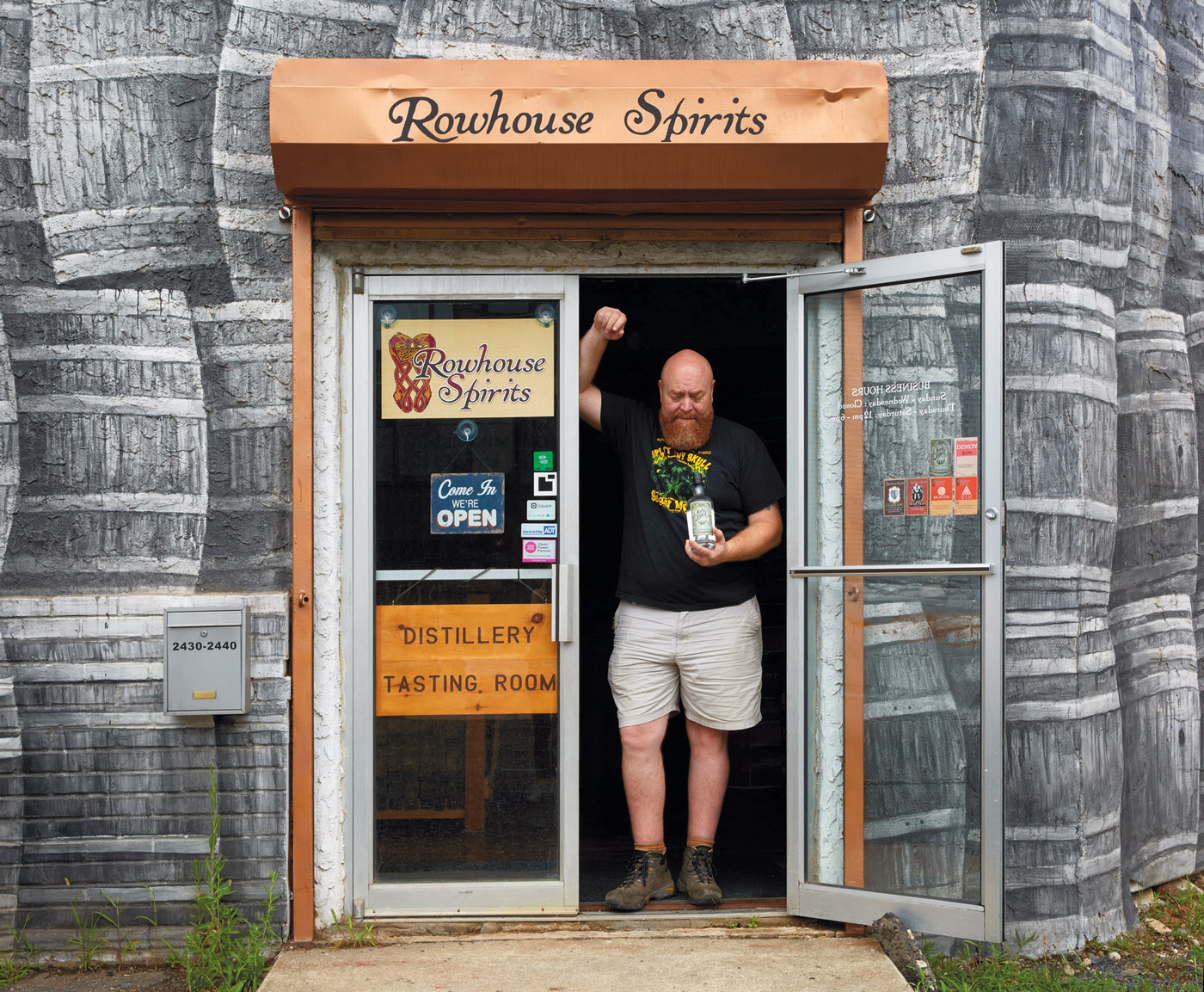
Owner and Master Distiller, Dean Browne, of Rowhouse Spirits Distillery
“You have to be able to make a carrot or beet spirit two weeks later that’s just as good as the first one,” Palotas says. “We wanted a lot of control of the process to create repeatable products at a small scale, and we did that through automation.” One piece of equipment that doesn’t come from overseas: a custom carbon-filtration system made by a neighbor is eight times faster than the previous machine. “Whenever something doesn’t work,” Palotas says, “we figure out a way around it.”
Boardroom’s technology is built on processing produce, which is the most difficult thing to distill, according to Palotas. Temperature control is key. Fruit and vegetables need a cold fermentation. The wrong temperature can be disastrous, as the team learned the hard way early on when foamy, red beet juice poured out of a tank, making the distillery look like a horror-movie set.
Sugar content in the vegetables drives the final yield. During fermentation, yeast eats the sugar and produces alcohol, which is then distilled, and proofed to bottle strength (45 to 46 percent ABV or 90 to 92 proof ).In the end, each bottle of B contains about eight pounds of beets and each bottle of C has about thirteen pounds of carrots. The distillery is still testing vegetables from different states and suppliers, hoping to land on a reliable local grower.
The final product is a brandy-style eau de vie that falls under the Distilled Spirits Specialty category in Pennsylvania and sells for $29.99 per bottle.
Public reaction has been mixed. Beet, which was released in October 2016, is a polarizing spirit, according to Marat: “It’s like gin; you either love it or you hate it. The nose is so bold that people who love beets are all about it.” The carrot spirit is reminiscent of cooked carrots, with an almost caramelized sweetness. As unusual spirits, they don’t fly off the shelves like Boardroom’s vodka. With 50 to 100 people visiting the tasting room on a weekend day, the company educates consumers on its product line, including its European-style spirits, one drinker at a time.
B and C provide a challenge to local mixologists who want to work with a completely different ingredient. It’s currently on the drink menus at Maison 208, Vedge, Fork, St. Benjamin’s Brewery and nearby Stove & Tap. Eventually Boardroom plans to sell B and C in liquor stores, but for now, they’re available at the distillery’s tasting room and at farmers’ markets, including ones in Ambler, Conshohocken, Perkasie, Upper Merion and the Reading Terminal Market. The company hopes that chefs will start using them in the kitchen, like nearby Brickside Grill has done by curing salmon in the beet spirit.
Marat, Zsuzsa and Vlad plan to continue creating their full Periodic Table of Spirits with fruit and vegetable distillates. A, an apple brandy, will be released in the fall. Later down the line, they’ll make Cr (celery root), P (pear, with unaged and barrel-aged releases) and apricot, harking back to Marat’s childhood.
As Marat puts it: “The whole idea of these spirits is capturing the experience of going up to a pear tree at peak harvest: plucking the pear, smelling it, biting into it. We’re trying to capture that experience in a glass.”
“Five years ago, I don’t think we would have been successful, and five years in the future, we’d be too late, so it was just the right time,” he says.
“We want to have fun and educate people. It’s the spirit of what we’re trying to do.”
“I make quite a bit of esoteric booze,
so I spend a lot of time in the tasting
room explaining to people what
these things are and why I make
them,” Browne says.
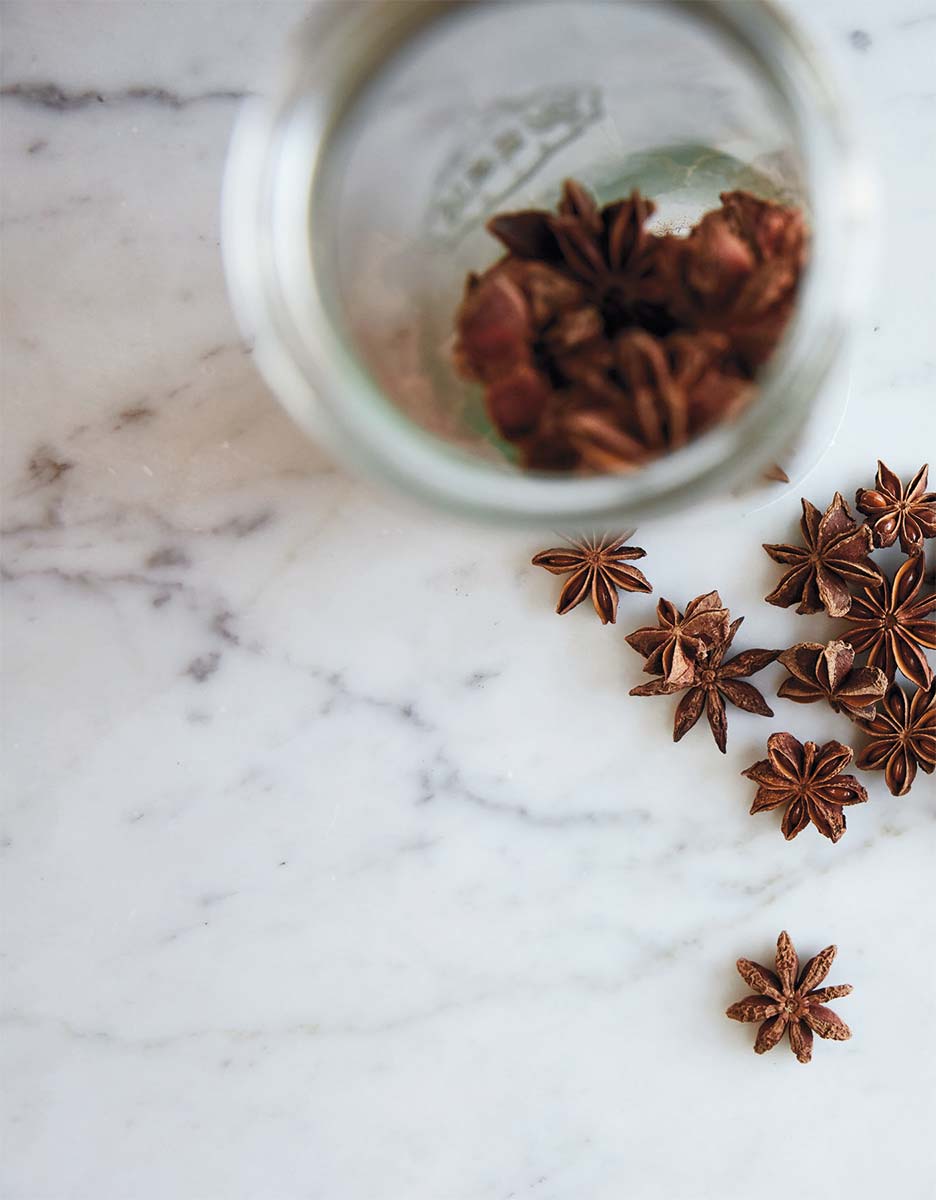
Where to drink Philly’s unusual spirits:
PHILADELPHIA DISTILLING
25 E. Allen St., Philadelphia
philadelphiadistilling.com
The new Fishtown distillery offers tours,
tastings and a full food menu.
BOARDROOM SPIRITS DISTILLERY
575 W. 3rd St., Lansdale
boardroomspirits.com
The Lansdale distillery has a recently expanded
2,500-square-foot tasting room.
ROWHOUSE SPIRITS DISTILLERY
2430 Frankford Ave., East Kensington
rowhousespirits.com
Taste Rowhouse’s Nordic Akvavit, Bear Trap
and Amaro with owner Dean Browne.


